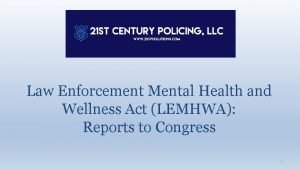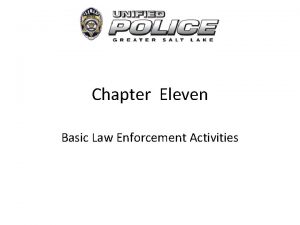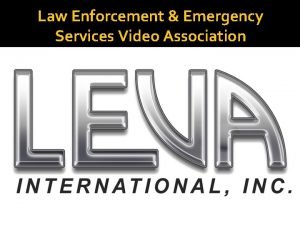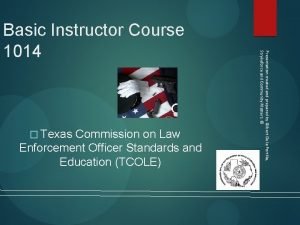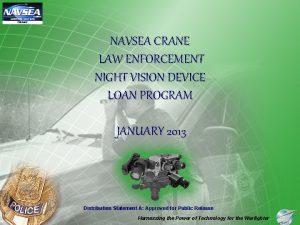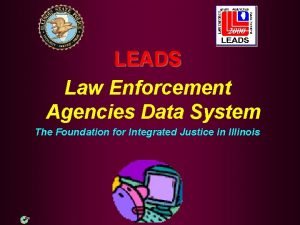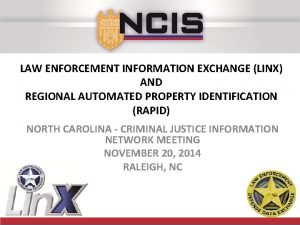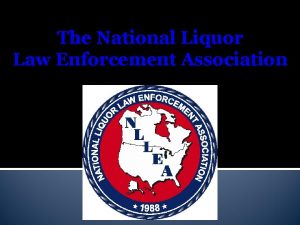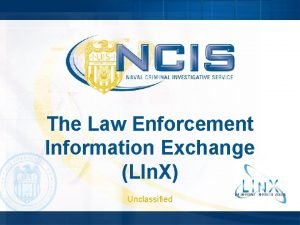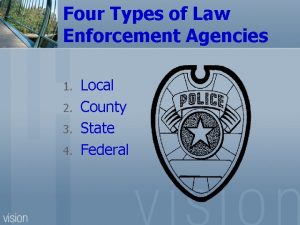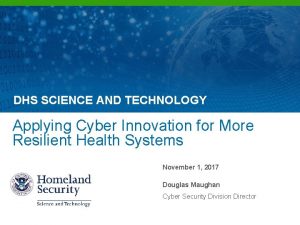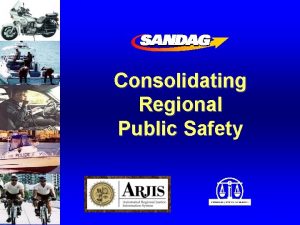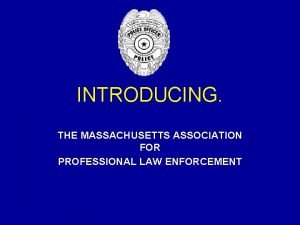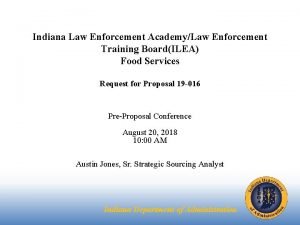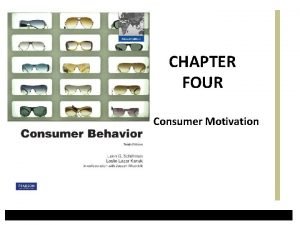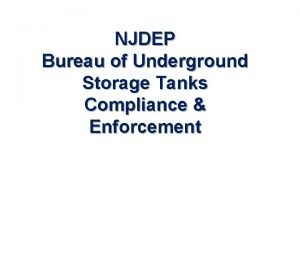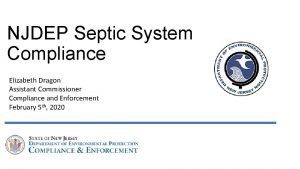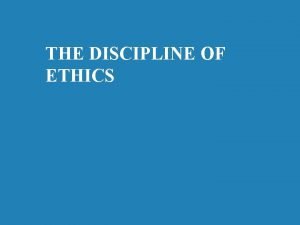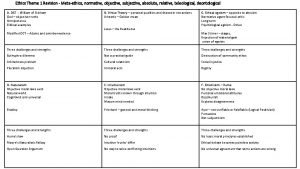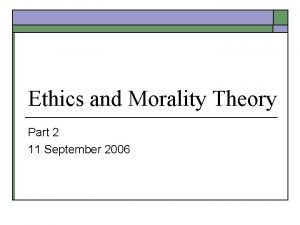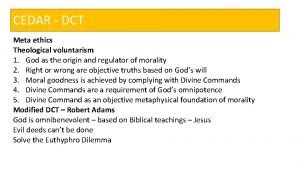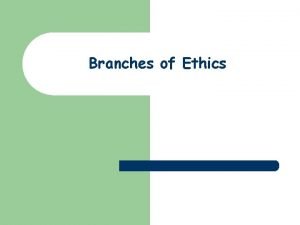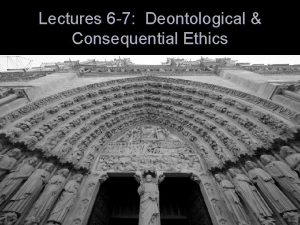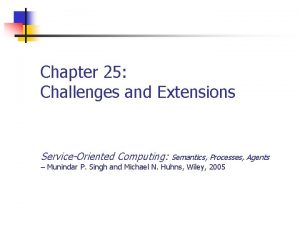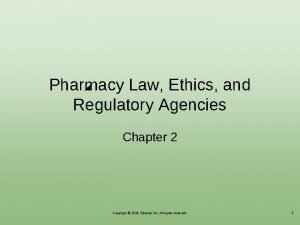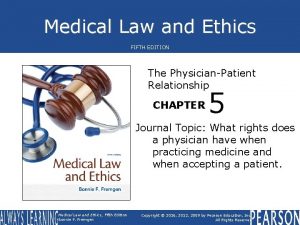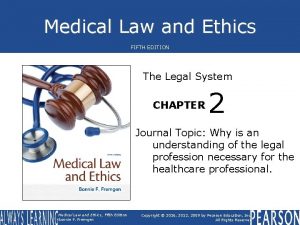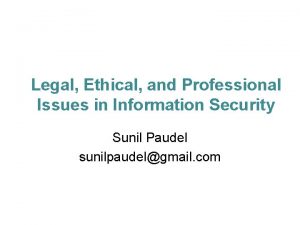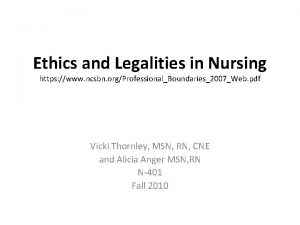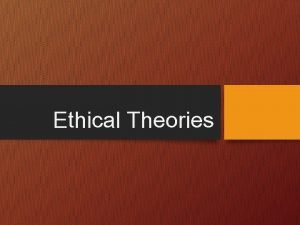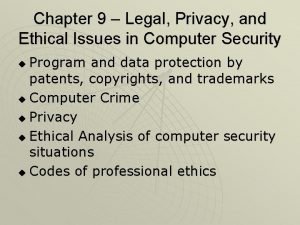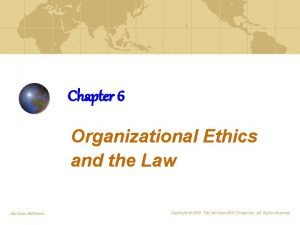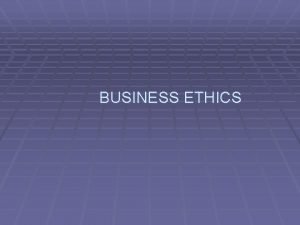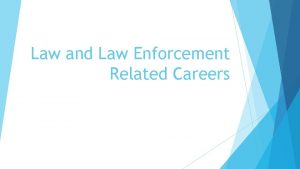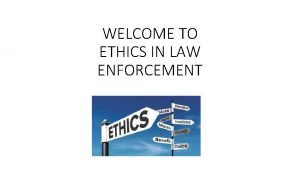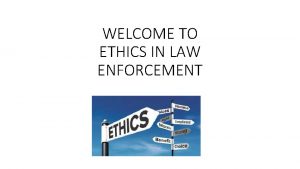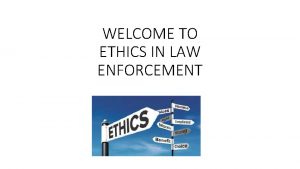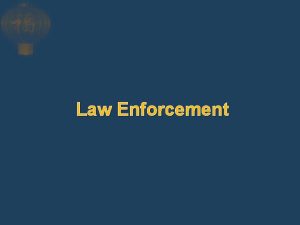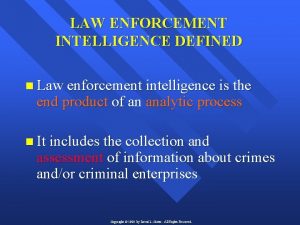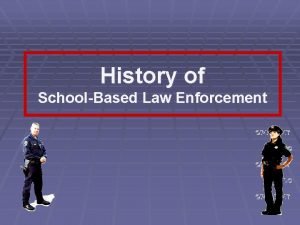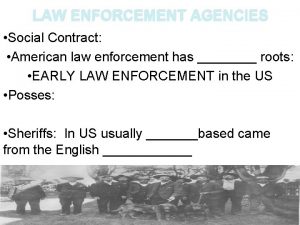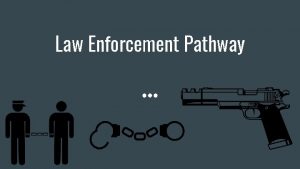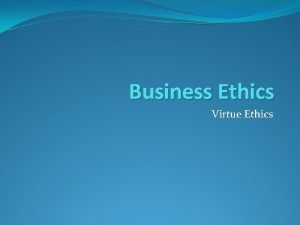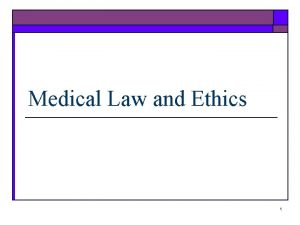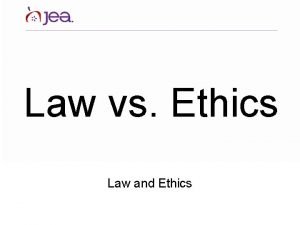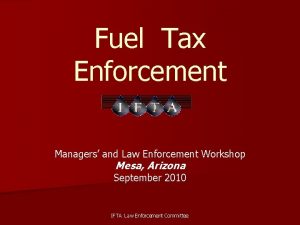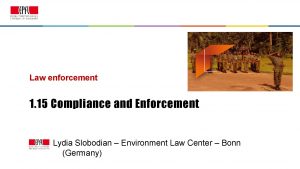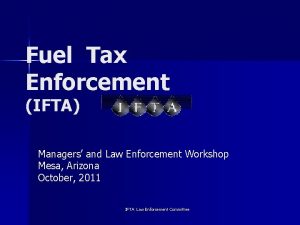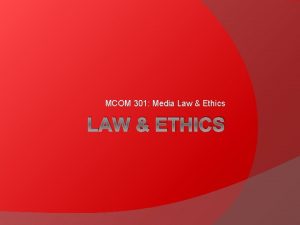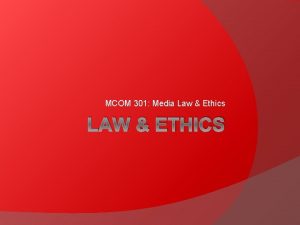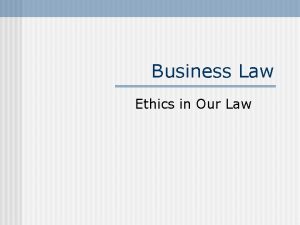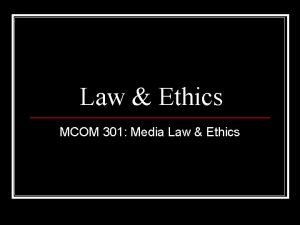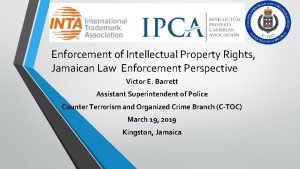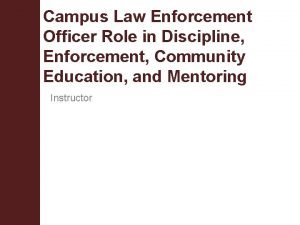WELCOME TO ETHICS IN LAW ENFORCEMENT Goals and




















































- Slides: 52

WELCOME TO ETHICS IN LAW ENFORCEMENT

Goals and Objectives: Refer to the POST Goals and Objectives

Definition of Ethics: Ethics are a principle of right or good behavior - a guiding philosophy

“It is not who is right, but what is right counts” –Thomas Huxley When Officers fail to do what is right, and especially when they do what is blatantly wrong, they erode public trust and degrade law enforcement’s ability to work within the community.

Definition of Professionalism: • Professional status • 3 keys components to being professional • Methods • you will soon learn, if you have not already, that being a law enforcement officer requires extensive training and mastery of specialized knowledge and skills • Character • Police officers are expected to have a professional character and have good morals • Standards • You are required to live to the highest standards both on and off-duty.

The Teacher • Knows the job • Understands the public may not understand • They calmly help the public • They do not compete with others

The Leader • They are courageous • They may not know it all • Every one will turn to them for answers • Is a role model for everyone • Must know their own Strengths and Weaknesses

The Learner • You NEVER stop learning • They believe in self discipline • They are a “go-getter” • Always looking to improve “The man who graduates today and stops learning tomorrow is uneducated the day after”.

Morals • You need to act not only legally but morally • You need to be accountable in your actions • Determine if your actions are necessary and done with openness • Professional discretion


Integrity • Doing the RIGHT thing always • Being honest is apart of having strong morals • Never swaying the truth or facts • Even in private life you must have integrity • It is not nor will it ever be considered a negotiable matter “Real Integrity is doing the right thing, knowing that nobody’s going to know whether you did it or not. ”

On/Off Duty Nothing changes when you are off duty. You are still held at a higher standard for your profession, it will be up to you to live your life as good or badly as you want, but remember, nothing is incorruptible except personal character and honesty. If these become corrupt, it is because of your own desire to let it happen.

What do ethics mean to you? • Judgment • Moral Behavior • Values You will be challenged with either things or by people from time to time and this is why ethics play such a huge role. Where do you stand? It is a lifetime commitment on and off duty.

The Law Enforcement Code of Ethics

As a Law Enforcement Officer my fundamental duty is to serve mankind; to safeguard lives and property; to protect the innocent against deception, the weak against oppression or intimidation, and the peaceful against violence or disorder; and to respect the Constitutional rights of all men to liberty, equality and justice.

I will keep my private life unsullied as an example to all; maintain courageous calm in the face of danger, scorn, or ridicule; develop selfrestraint; and be constantly mindful of the welfare of others. Honest in thought and deed in both my personal and official life, I will be exemplary in obeying the laws of the land the regulations of my department.

Whatever I see or hear of a confidential nature or that is confided to me in my official capacity will be kept ever secret unless revelation is necessary in the performance of my duty.

I will never act officiously or permit personal feelings, prejudices, animosities or friendships to influence my decisions. With no compromise for crime and with relentless prosecution of criminals, I will enforce the law courteously and appropriately without fear or favor, malice or ill will, never employing unnecessary force or violence and never accepting gratuities.

I recognize the badge of my office as a symbol of public faith and I accept it as a public trust to be held so long as I am true to the ethics of the police service. I will constantly strive to achieve these objectives and ideals, dedicating myself before God to my chosen profession…law enforcement.

Canon of Police Ethics: 11 Articles

Canons of Police Ethics • Article 1 – Primary Job Responsibility • The primary responsibility of the police service, and of the individual officer, is the protection of the people of the United States through the upholding of their laws; chief among these is the Constitution of the United States and its amendments. The law enforcement officer always represents the whole of the community and its legally expressed will and is never the arm of any political party or clique.

Canons of Police Ethics • Article 2 – Limitations of Authority • The first duty of a law enforcement officer, as upholder of the law, is to know its bounds upon him in enforcing it. Because he represents the legal will of the community, be it local, state or federal, he must be aware of the limitations and proscriptions which the people, through law have placed upon him. He must recognize the genius of the American system of government which gives to no man, groups of men, or institution, absolute power, and he must insure that he, as a prime defender of that system, does not pervert its character.

Canons of Police Ethics • Article 3 – Duty to Be Familiar with the Law and with Responsibilities of Self and Other Public Officials • The law enforcement officer shall assiduously apply himself to the study of the principles of the laws which he is sworn to uphold. He win make certain of his responsibilities in the particulars of their enforcement, seeking aid from his superiors in matters of technicality or principle when these are not clear to him; he will make special effort to fully understand his relationship to other public officials, including other law enforcement agencies, particularly on matters of jurisdiction, both geographically and substantively.

Canons of Police Ethics • Article 4 – Utilization of Proper Means to Gain Proper Ends • The law enforcement officer shall be mindful of his responsibility to pay strict heed to the selection of means in discharging, the duties of his office. Violations of law or disregard for public safety and property on the part of an officer are intrinsically wrong; they are selfdefeating in that they instill in the public mind a like disposition. The employment of illegal means, no matter how worthy the end, is certain to encourage disrespect for the law and its officers. If the law is to be honored, it must first be honored by those who enforce it.

Canons of Police Ethics • Article 5 – Cooperation with Public Officials in the Discharge of Authorized Duties • The law enforcement officer shall cooperate fully with other public officials in the discharge of authorized duties, regardless of party affiliation or personal prejudice. He shall be meticulous, however, in assuring himself of the propriety, under the law, of such actions and shall guard against the use of his office or person, whether knowingly or unknowingly, in any improper or illegal action. In any situation open to question, he shall seek authority from his superior officer, giving him a full report of the proposed service or action.

Canons of Police Ethics Article 6 – Private Conduct The law enforcement officer shall be mindful of his special identification by the public as an upholder of the law. Laxity of conduct or manner in private life, expressing either disrespect for the law or seeking to gain special privilege, cannot but reflect upon the police officer and the police service. The community and the service require that the law enforcement officer lead the life of a decent and honorable man. Following the career of a policeman gives no man special perquisites. It does give the satisfaction and pride of following and furthering an unbroken tradition of safeguarding the American republic. The officer who reflects upon this tradition will not degrade it. Rather, he will so conduct his private life that the public will regard him as an example of stability, fidelity, and morality.

Canons of Police Ethics • Article 7 – Conduct toward the Public • The law enforcement officer, mindful of his responsibility to the whole community, shall deal with individuals of the community in a manner calculated to instill respect for its laws and its police service. The law enforcement officer shall conduct his official life in a manner such as will inspire confidence and trust. Thus, he will be neither overbearing nor subservient, as no individual citizen has an obligation to stand in awe of him nor a right to command him. The officer will give service where he can, and require compliance with the law. He will do neither from personal preference or prejudice but rather as a duly appointed officer of the law discharging his sworn obligation.

Canons of Police Ethics Article 8 – Conduct in Arresting and Dealing with Law Violators The law enforcement officer shall use his powers of arrest strictly in accordance with the law and with due regard to the rights of the citizen concerned. His office gives him no right to prosecute the violator nor to mete out punishment for the offense. He shall, at all times, have a clear appreciation of his responsibilities and limitations regarding detention of the violator; he shall conduct himself in such a manner as will minimize the possibility of having to use force. To this end he shall cultivate a dedication to the service of the people and the equitable upholding of their laws whether in the handling of law violators or in dealing with the law-abiding.

Canons of Police Ethics • Article 9 – Gifts and Favors • The law enforcement officer, representing government, bears the heavy responsibility of maintaining, in his own conduct, the honor and integrity of all government institutions. He shall, therefore, guard against placing himself in a position in which any person can expect special consideration or in which the public can reasonably assume that special consideration is being given. Thus, he should be firm in refusing gifts, favors, or gratuities, large or small, which can, in the public mind, be interpreted as capable of influencing his judgment in the discharge of his duties.

Canons of Police Ethics • Article 10 – Presentation of Evidence • The law enforcement officer shall be concerned equally in the prosecution of the wrong-doer and the defense of the innocent. He shall ascertain what constitutes evidence and shall present such evidence impartially and without malice. In so doing, he will ignore social, political, and all other distinctions among the persons involved, strengthening the tradition of the reliability and integrity of an officer's word. • The law enforcement officer shall take special pains to increase his perception and skill of observation, mindful that in many situations his is the sole impartial testimony to the facts of a case.

Canons of Police Ethics • Article 11 – Attitude toward Profession • The law enforcement officer shall regard the discharge of his duties as a public trust and recognize his responsibility as a public servant. By diligent study and sincere attention to selfimprovement he shall strive to make the best possible application of science to the solution of crime and, in the field of human relationships, strive for effective leadership and public influence in matters affecting public safety. He shall appreciate the importance and responsibility of his office, and hold police work to be an honorable profession rendering valuable service to his community and his country.

Bribes & Gratuities It is hard to ignore the subject of gratuities in any class on peace officer ethics. Many articles appearing in law enforcement publications and academic journals discuss the topic, and civilians often identify it as an enduring problem among peace officers. Still, many officers believe there is nothing wrong with accepting gratuities.

Gratuities • Receiving free coffee • Free food • Anything that a civilian would have to purchase if faced with the same situation.

Bribes • Accepting money for reasons unknown. • Looking the other way for personal gain. • Receiving gifts in exchange for a service.

One distinction that can be made in these dilemmas is between: True gratuities, something given to any officer as a matter of policy, and Bribes, something given to an individual in return for a specific action. However, both gratuities and bribes can become problematic issues for officers and agencies.

10 Deadly Ethical Sins 1. 2. 3. 4. 5. 6. Lying Alcohol/Drugs Stealing Property Stealing Time Money Cynicism 7. Domestic Violence 8. Inappropriate Sexual Conduct 9. Excessive Force 10. Text Messaging, EMail & Social Media

The Six Pillars of Character • Trustworthiness- honesty, integrity, promise keeping, loyalty and fortitude • Respect • Responsibility- accountability, pursuit of excellence and self restraint • Justice and Fairness • Caring • Civil Virtue and Citizenship

Ethical Dilemma: • A situation in which the individual: • Does not know the right course of action • Has a difficult time doing what they know is right • Finds the wrong choice very tempting • Categories: • • • Discretion (legality) Duty (service) Honesty Loyalty Gratuities and/or Bribes

Causes of Unethical Behavior • • Attitude– the professional’s most valuable asset. Anger– a major cause of unethical behavior within law enforcement. Lust- next to hunger and thirst, lust is the most powerful human drive. Greed- flourishes throughout American society. Stress- under stress, people normally react the way they have been trained. Peer Pressure- no matter your age, it has a tremendous influence on behavior. Selfishness- “It’s all about me”

Result of unethical behavior • The public expects law enforcement to use their authority without malice or improprieties. • Failure in this area means that the citizens will strive to remove or limit that authority

Ask Yourself……. . Do I recognize who I am, what my personal code of ethics is and where it came from? Can I submit to the Department’s code of ethics without compromising the values and morals that I have adopted? Can I do the right thing, for the right reasons, each and every day? Am I prepared to face the ethical dilemmas and barriers that law enforcement officers encounter during their careers?

Statistics show that we lose 3 -4 times more officers each year to misconduct vs. death.

Conducting Misconduct Investigations � Why do we conduct investigations? ? ? � Community trust � Maintain integrity � Transparency � Police the Police � To protect our personnel, our Department, and the public

Investigations continued: • What happens if we don’t investigate complaints? ? ? • • • Loss of public trust Allegations of corruption “Sweeping things under the rug” “Good old boys club” Taint the “Thin Blue Line”

Types of Complaints: • Oral • Written • Internal • Anonymous • 3 rd Party

Investigative Process • Peace Officer’s Bill of Rights NRS 289 • The officer’s testimony is compelled, but cannot be used against him criminally • (Garrity v. New Jersey, 385 U. S. 493) NAC 284 • Burden of proof is a preponderance of evidence.

Investigation Process • Generally…. • Once a complaint is made: • The original complainant will be interviewed. • Any substantiating documents will be reviewed. • Any witnesses or potential witnesses will be interviewed. • The subject of the investigation will be interviewed. Always tell the truth.

Nevada Department of Corrections Code Of Ethics – AR 339 • The Nevada Department of Corrections is committed to a code of ethics that will guide the performance, conduct and behavior of its employees. This code will ensure that our professionalism is reflected in the operation and activities of the Department and is recognized by all interested parties. In this light, the following principles are practiced: • Employees shall maintain high standards of honesty, integrity, and impartiality, free from any personal considerations, favoritism or partisan demands. • Employees shall be courteous, considerate, and prompt when dealing with the public, realizing that we serve the public. • Employees shall maintain mutual respect and professional cooperation in their relationships with other staff members of the Department of Corrections. • Employees shall be firm, fair, and consistent in the performance of their duties. Employees shall treat others with dignity, respect, and compassion and provide humane custody and care, void of all retribution, harassment or abuse.

Nevada Department of Corrections Code Of Ethics Cont… • • • Employees shall uphold the tenets of the United States Constitution, its amendments, the Nevada Constitution, federal and State laws, rules and regulations, and policies of the Department. Whether on or off duty, in uniform or not, employees shall conduct themselves in a manner that will not bring discredit or embarrassment to the Department of Corrections and the State of Nevada. Employees shall report without reservation any corrupt or unethical behavior that could affect either inmates, employees, or the integrity of the Department of Corrections. Employees shall not use their position for personal gain. Employees shall maintain confidentiality of information that has been entrusted to them and designated as such.

Nevada Department of Corrections Code Of Ethics Cont… • • • Employees shall not permit themselves to be placed under any kind of personal obligation that could lead any person to expect official favors. Employees shall not accept or solicit from anyone, either directly or indirectly, anything of economic value, such as a gift, gratuity, favor, entertainment, or loan which is, or may appear to be, designed to influence their official conduct. Employees will not discriminate against any inmate, employee or any member of the public on the basis of race, gender, creed, or national origin. Employees will not sexually harass or condone sexual harassment with or against any person. Employees shall maintain the highest standards of personal hygiene, grooming and neatness while on duty or otherwise representing the Department.

Ethics • Doing the right thing even when no one is watching you

Conclusion • Everything we do is up for scrutiny • There are cameras everywhere and it is legal to record our behavior • Do not jeopardize your career due to a momentary lapse of integrity, morals, ethics, or immoral or unethical behavior!!
 Strategic goals tactical goals operational goals
Strategic goals tactical goals operational goals Strategic goals tactical goals operational goals
Strategic goals tactical goals operational goals Lemhwa report to congress
Lemhwa report to congress Military and law enforcement
Military and law enforcement Military and law enforcement
Military and law enforcement Law enforcement video association
Law enforcement video association Texas commission on law enforcement
Texas commission on law enforcement Law enforcement night vision
Law enforcement night vision Law enforcement agencies data system
Law enforcement agencies data system Law enforcement information exchange
Law enforcement information exchange Valeap
Valeap Nllea
Nllea Law enforcement information exchange
Law enforcement information exchange Elvis vehicle inspection
Elvis vehicle inspection Law enforcement agencies
Law enforcement agencies Law enforcement first responder
Law enforcement first responder Law enforcement agency
Law enforcement agency Calphoto dmv law enforcement
Calphoto dmv law enforcement Massachusetts association for professional law enforcement
Massachusetts association for professional law enforcement Indiana law enforcement training board
Indiana law enforcement training board Gst law enforcement
Gst law enforcement Newton's first law and second law and third law
Newton's first law and second law and third law Si unit of newton's first law
Si unit of newton's first law General goals and specific goals
General goals and specific goals Examples of generic goals and product-specific goals
Examples of generic goals and product-specific goals Micro and macro ethics difference
Micro and macro ethics difference Boyle's law charles law avogadro's law
Boyle's law charles law avogadro's law Avogadro's law constants
Avogadro's law constants Njdep compliance and enforcement
Njdep compliance and enforcement Elizabeth dragon njdep
Elizabeth dragon njdep Wise men three clever are we
Wise men three clever are we Descriptive ethics vs normative ethics
Descriptive ethics vs normative ethics Normative ethical questions
Normative ethical questions Descriptive ethics vs normative ethics
Descriptive ethics vs normative ethics Metaethics vs normative ethics
Metaethics vs normative ethics Descriptive ethics vs normative ethics
Descriptive ethics vs normative ethics Normative vs descriptive ethics
Normative vs descriptive ethics Is/ought distinction
Is/ought distinction Methaethics
Methaethics Consequential vs deontological
Consequential vs deontological Teleological ethics vs deontological ethics
Teleological ethics vs deontological ethics Pharmacy law ethics and regulatory agencies
Pharmacy law ethics and regulatory agencies Medical law and ethics 5th edition
Medical law and ethics 5th edition Medical law and ethics 5th edition
Medical law and ethics 5th edition Legal and ethical issues in information security
Legal and ethical issues in information security Legalities in nursing
Legalities in nursing Differences between law and ethics
Differences between law and ethics Ceng 291
Ceng 291 Uuu
Uuu Relationship between law and ethics
Relationship between law and ethics That's what i do
That's what i do Relationship between law and ethics
Relationship between law and ethics Objective of ethics
Objective of ethics


